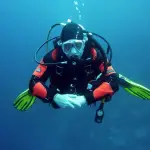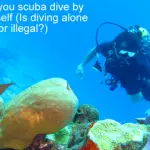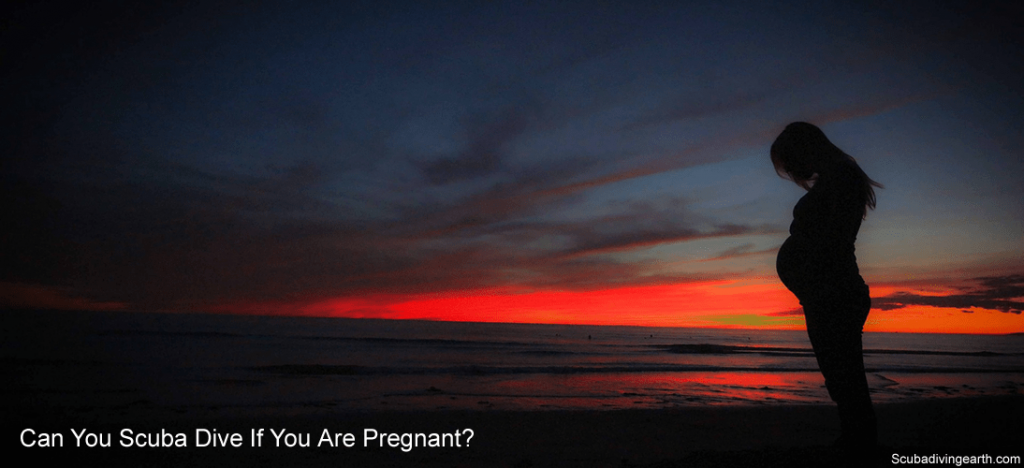
Is scuba diving safe during pregnancy is asked by would-be-mother scuba divers
If you’re a keen scuba diver and either pregnant or looking to conceive you may want to know whether you can scuba dive if you are pregnant.
Not much research has been carried out with pregnant mothers and scuba diving. But that doesn’t mean the potential risks shouldn’t be ignored. You mustn’t scuba dive if you are pregnant, which is the answer you probably already knew in your heart to be the case. The answer isn’t based on medical research, but it’s known that foetuses aren’t protected from the risks of nitrogen bubbles and no mother would want to risk harming their unborn baby.
The best way to do more diving is to book yourself on a scuba diving liveaboard. You can check the latest and best deals on liveaboards using the following window:
Can you scuba dive if you are pregnant?
The short answer is unfortunately; no you shouldn’t dive during pregnancy. For those would-be mummy-scuba divers I’m sorry to disappoint you, but I’m all about safe diving. Which in this case is not only about your safety, but it’s also about your unborn baby’s safety too.
There’s no empirical evidence for this answer as there haven’t been too many experiments on women scuba divers who are pregnant. Which is quite obvious when you think about it.
You probably won’t get many volunteers coming forward to be part of an experiment on decompression sickness (DCS) whilst pregnant. Which means that the information available to patients and physicians about the effects of diving on gestation are difficult for patients and physicians to acquire.
But there have been experiments that have been done on animals in hyperbaric chambers. These experiments back up the above answer. More about this further down in this article.
There are also a few practical considerations about scuba diving when pregnant. However, the main risk to your unborn baby is from the pressure at depth and the decompression process your body and your baby goes through on your ascent to the surface.
So whilst you’re pregnant enjoy snorkeling instead, as generally speaking snorkeling while pregnant can be done safely.
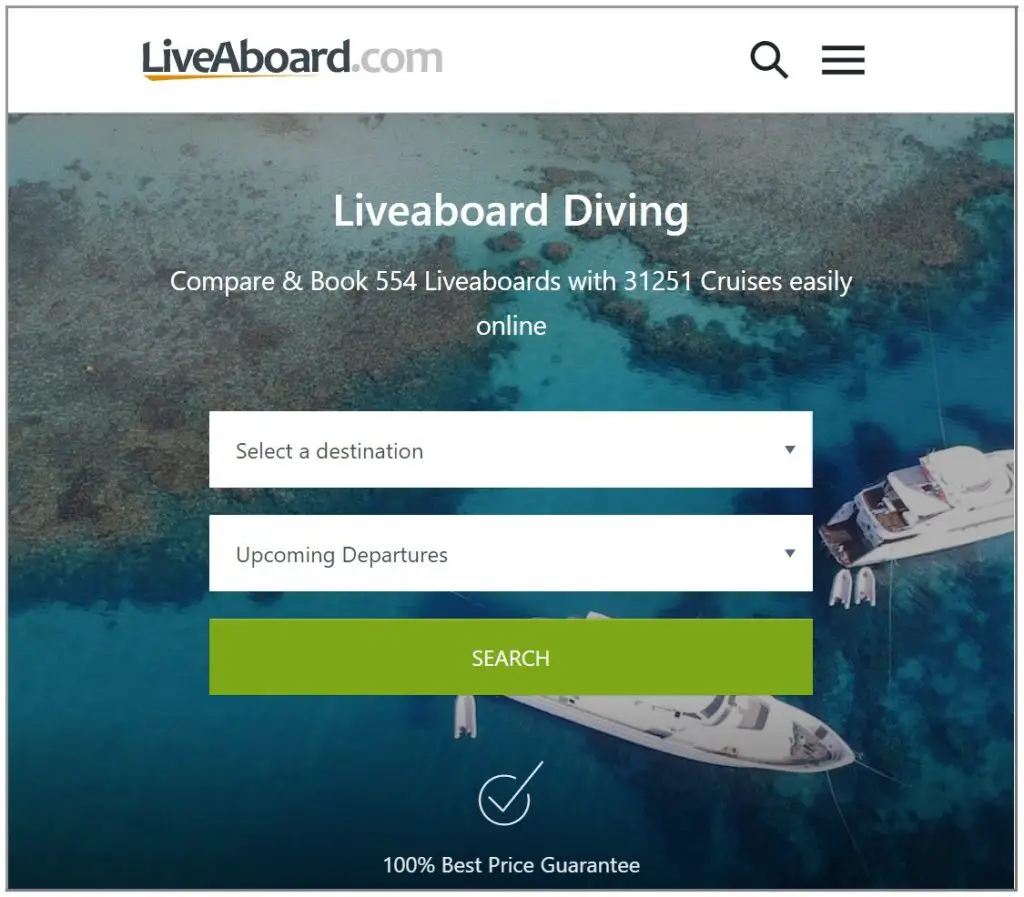
Developmental abnormalities in foetuses associated with hyperbaric exposure
In this article on Divers Alert Network, this discusses the developmental abnormalities associated with hyperbaric exposure on pregnant mothers.
Potential pregnancy abnormalities caused by scuba diving include:
- Low birth weights.
- Premature delivery.
- Foetal abortion.
- Bubbles in the amniotic fluid (more about this too later in the article).
- Abnormal skull development.
- Malformed limbs.
- Abnormal heart development.
- Limb weakness associated with decompression sickness.
- Blindness.
That’s a long list of possible problems associated with pregnancy from scuba diving and decompression-linked complications. Which means that even if you’re an avid scuba diver and absolutely love the sport, I would suggest it’s not worth the risk to your unborn baby.
Enjoy your time being pregnant and don’t add any unnecessary stress on yourself. Plus why risk any chance of your unborn baby developing abnormalities. Which possibly leads to the next question asked which is how deep can you dive while pregnant?
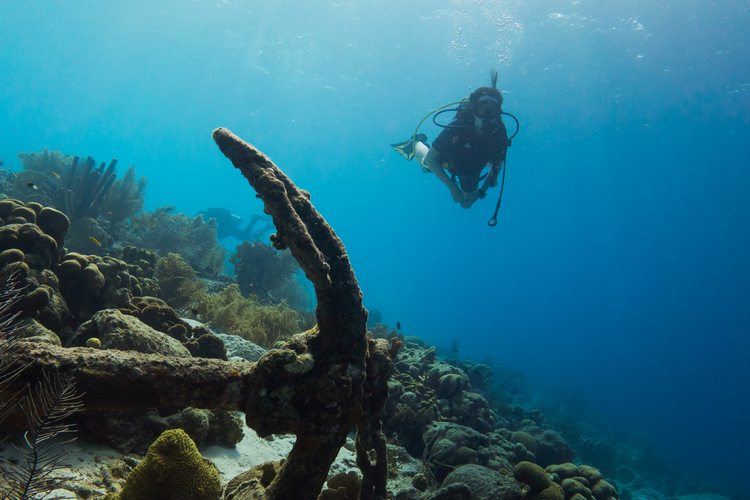
How deep can you dive while pregnant?
No depth of dive is suitable while you are pregnant, which includes shallow diving while pregnant. A pulmonary barotrauma or arterial gas embolism can occur in an ascent of just one metre (3 feet), which means there are potential risks to unborn foetuses associated with scuba diving from any depth.
Can you scuba dive while trying to get pregnant?
You shouldn’t scuba dive while trying to get pregnant. You may not know the exact time of conception and most women are unaware of pregnancy during early first trimester, as most women who don’t realise they are pregnant until after the six-week mark.
If you are actively trying to get pregnant you should avoid scuba diving and wait until you’ve given birth.
The RSTC medical form includes the question “Could you be pregnant, or are you attempting to become pregnant?” Which is part of the diver medical questions and whether you should be examined by your doctor before participating in recreational diver training.
Can you scuba dive in early pregnancy or within 4 weeks of first getting pregnant?
Don’t panic if by mistake you have scuba dived in early pregnancy before you first realised you were pregnant. In a review about should pregnant women scuba dive, research into pregnant sheep exposed to simulated depth in hyperbaric chambers found no foetal bubbles in very early gestation.
For example, if you were scuba diving 4 weeks pregnant because you hadn’t realised this to be the case, everything should be fine with your unborn baby. But you may want to have your baby checked by your doctor. But the advice for pregnant mothers is not to scuba dive at any stage of pregnancy if you know you are pregnant.
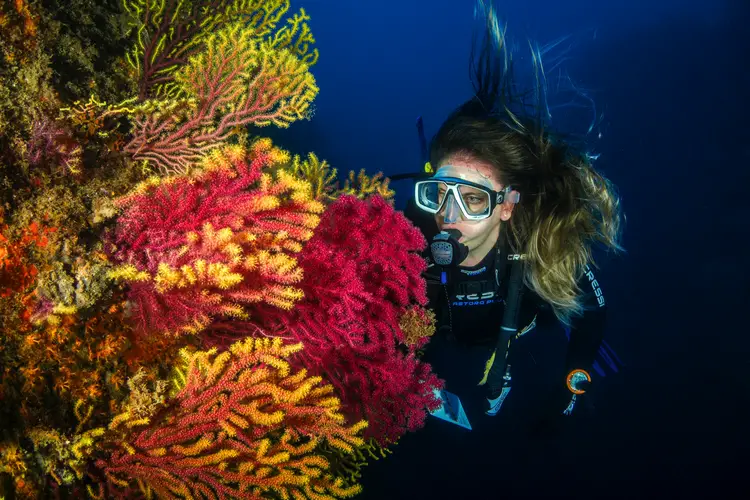
What about scuba diving before I knew I was pregnant?
If you’ve been scuba diving unaware of your pregnancy it’s likely to be the early stages of gestation, as most women aren’t aware of pregnancy until the six-week mark. You shouldn’t panic if you scuba dived before knowing you were pregnant during first trimester, but check with your doctor.
Many women have dived whilst pregnant not realising they are carrying a baby. But their babies have been perfectly fine and born without any defects. Many pregnant mothers continue to drink alcohol before knowing they are pregnant too. But this shouldn’t cause problems for the unborn baby either.
However, don’t be confused by this, as I’ve already explained you shouldn’t dive when pregnant. Which means if you know you’re pregnant or if you are trying to conceive, don’t scuba dive.
You have to accept you may have decompression problems on the dive. For example, if you accidently came up too quickly or missed a decompression stops this may harm your unborn baby. Not forgetting that this will cause problems for the mother in any event.
So as long as your dive was to normal recreational depths. Plus if you had a normal safe ascent and where necessary carried out the required decompression stops together with a 5-6 metres (16-20 feet) safety stop, your baby should be okay.
But as already advised, I recommend you speak with your doctor and perhaps to go for a check-up. This will help you put your mind at rest and give the doctors chance to check that all is okay with your unborn baby.
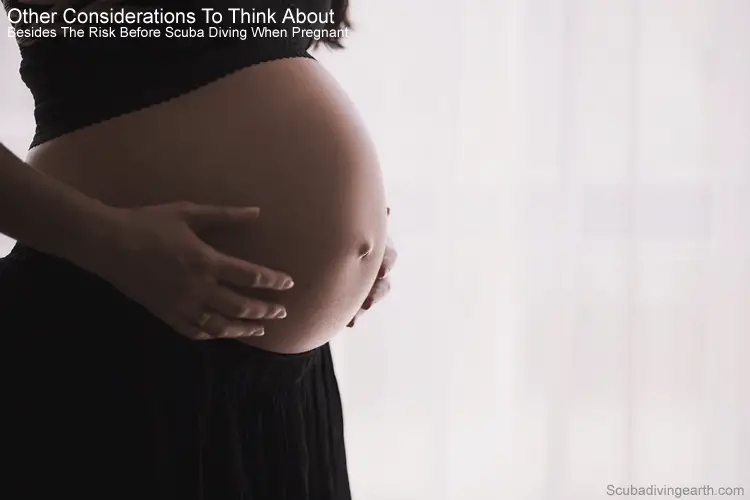
Considerations besides the risk to think about before scuba diving when pregnant
If you are still considering scuba diving when pregnant there are some other considerations to take account of. These include:
- Fitting into your wetsuit when pregnant.
- Nausea, vomiting and exhaustion may impact your scuba diving.
- Emotional swings scuba diving whilst pregnant.
- Pregnancy rhinitis or a stuffy nose.
- Decompression sickness risk factors and susceptibility.
- Does scuba diving increases the likelihood of miscarriage or birth defects?
- Can the foetus have clinically significant DCS in the absence symptoms in the mother?
- What are the risks of hyperbaric oxygen therapy if maternal DCS occurs?
1. Fitting into your wetsuit or other exposure suits when pregnant can be problematic
As your pregnancy progresses it will become increasingly difficult to fit into your wetsuit, semi-drysuit or drysuit. As far as know there are no specialty pregnancy or maternity wetsuits or drysuits on the market. This means that as you grow in size your regularly fitting exposure suits will start to get tight around weeks 11-12 of your pregnancy.
The further you progress through your pregnancy, the tighter your exposure suit will become.
More Reading: What is the difference between a wetsuit and a dry suit?
2. Nausea, vomiting and exhaustion may impact your scuba diving when pregnant
Normally in the first trimester of pregnancy and around week six of your term you may begin to experience the down side of pregnancy. These symptoms may include feeling nauseous, vomiting or morning sickness and exhaustion.
In addition to these symptoms you may also experience super-sore breasts, headaches and feeling faint.
All of the above symptoms are probably not conducive to scuba diving. At the very least these symptoms may not allow for a pleasant diving experience.
If you’ve ever got onto a dive boat with a hangover or feeling nauseous, you know this is one of the worst things you can do. Which would be the same as having morning sickness on a dive boat.
Also, you may not like the idea of having to put a tight-fitting wetsuit over sore breasts too. However, what you may like to do is to dream about that next scuba diving holiday once you’ve given birth. So please take a look through these amazing liveaboard trips.
Table of dive liveaboards
This list of liveaboards is in descending customer rating order, followed by Scuba Diving Luxury Rating (SDE Lux Rating, see below), so the liveaboards with the highest customer rating and the best SDE lux rating will be at the top of the list. If you want to change the list order, use the “Sort by” dropdown below.
| Discover Liveaboard | Customer Rating | SDE Lux Rating % | Flexible Booking | Dive Courses | Dietary Requirements | Nitrox | Country | |
|---|---|---|---|---|---|---|---|---|
 |
Review: MV Seaisee; Book: MV Seaisee | 10 | 90% | YES | NO | YES | YES | Indonesia |
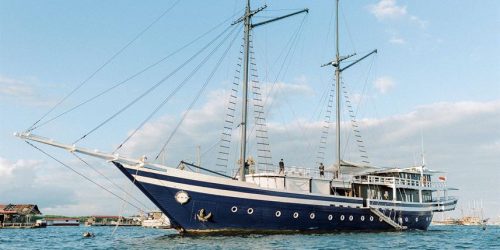 |
Review: Scubaspa Zen; Book: Scubaspa Zen | 10 | 88% | YES | YES | YES | YES | Indonesia |
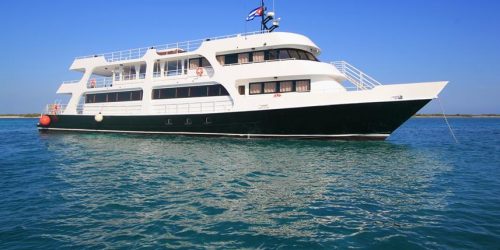 |
Review: Jardines Avalon Fleet - Charter Only; Book: Jardines Avalon Fleet - Charter Only | 10 | 83% | YES | NO | YES | YES | Cuba |
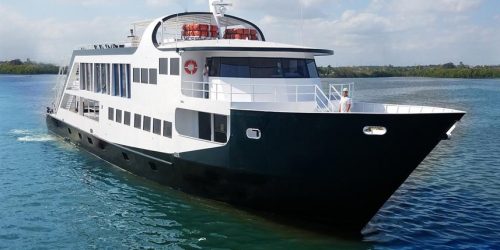 |
Review: Jardines Avalon Fleet; Book: Jardines Avalon Fleet | 10 | 83% | YES | NO | YES | YES | Cuba |
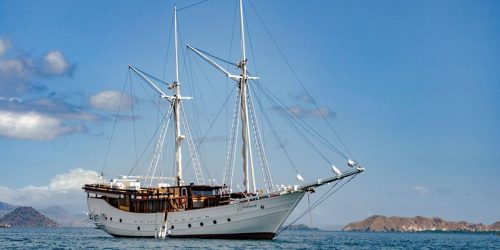 |
Review: Jakaré; Book: Jakaré | 10 | 81% | YES | YES | YES | YES | Indonesia |
 |
Review: All Star Cuan Law; Book: All Star Cuan Law | 10 | 79% | YES | YES | YES | NO | Virgin Islands |
 |
Review: Leyla; Book: Leyla | 10 | 73% | YES | YES | YES | NO | Indonesia |
The Scuba Diving Earth Luxury Rating (SDE Lux Rating) is explained on each liveaboard review when you click the “Discover Liveaboard” link, and is my own Liveaboard Luxury Rating I’ve assigned to all liveaboards. Choosing between liveaboards is helped by customer scores, and if you get stuck choosing between two or three liveaboards, where each one has a high customer score out of 10, you can use the SDE Luxury Rating to help narrow down your choice.
Think about it like using Booking.com when searching for the best hotel. Booking.com also use a customer score where each customer rates hotels out of 10. This is similar to the liveaboard customer rating, which is also rated out of 10. But let’s say you only like to stay in hotels rated 8 and above on Booking.com, but you also want the hotel to have WIFI or parking, or to have a swimming pool etc. The features each hotel has is usually secondary to the score out of 10.
3. Emotional swings scuba diving whilst pregnant
Every pregnancy is different as is every woman experiences pregnancy in different ways. But many pregnant mothers experience emotional swings around week five of the first trimester of pregnancy.
This may not be the case for all women who are pregnant. But it may be worth you reading the section in this article about what can cause panic attacks in scuba divers.
Nitrogen Narcosis or the Narks can be triggered in scuba divers at around 30 metres (100 feet) or more. The risk of getting anxiety or fear induced narcosis increases in scuba divers who are emotionally stressed or feeling depressed at the time.
At certain points during pregnancy, some women can get quite low. Around 10-12 percent of women experience depression during pregnancy.
Which means there could be an increased chance of Nitrogen Narcosis during pregnancy if at the time you are experiencing a depressed state of mind.
4. Pregnancy rhinitis or a stuffy nose is a reason not to scuba dive
Pregnant women who suffer from pregnancy rhinitis should not scuba dive with stuffy nose symptoms, which is the same as when it’s never safe to go scuba diving with a cold, blocked sinuses and Eustachian tubes.
Pregnancy rhinitis is congestion or a stuffy nose during pregnancy. It will feel similar to the nasal congestion you get when you have a cold. Rhinitis is caused from a higher level of estrogen, which causes the lining of the nasal passages to swell.
This affects the amount of mucus produced and as a result could block your Eustachian tubes.
If you dive with blocked Eustachian tubes you’ll struggle to equalise your ears on descent and on your ascent too. This could lead to a ruptured ear drum and to the loss of hearing.
5. Decompression sickness risk factors should be considered if you are pregnant
It’s not known if pregnancy is a in itself a decompression sickness risk factor. But it’s worth bearing in mind and at the very least holding-off scuba diving until you’ve given birth.
6. Does scuba diving increases the likelihood of miscarriage or birth defects?
The chances of a miscarriage due to scuba diving appears unlikely. After scuba diving gear was introduced to Ama divers, female Japanese Ama divers are known to scuba dive throughout pregnancy.
The small amount of available data suggests that virtually all Japanese Ama women carry their pregnancies to term. Whereas initial data on Korean Ama suggests that they carry only half of their pregnancies to term.
7. Can the foetus have clinically significant DCS in the absence symptoms in the mother?
Research in sheep demonstrated the presence of bubbles in their foetuses even though the mothers showed no objective symptoms of decompression illness. This included weakness or gait disturbance and any audible circulating bubbles.
But this research has been shown to lack substance due to how the tests were performed on the ewes. Which leaves us in the dark somewhat, but with the same conclusion to be cautious about scuba diving when pregnant.
8. What are the risks of hyperbaric oxygen therapy if maternal DCS occurs?
Hyperbaric oxygen has been used during pregnancy in Russia at lower partial pressures commonly used for treatment of DCS. Also, pregnant women have been exposed to hyperbaric oxygen therapy and there have been no reports of untoward effects on the foetus.
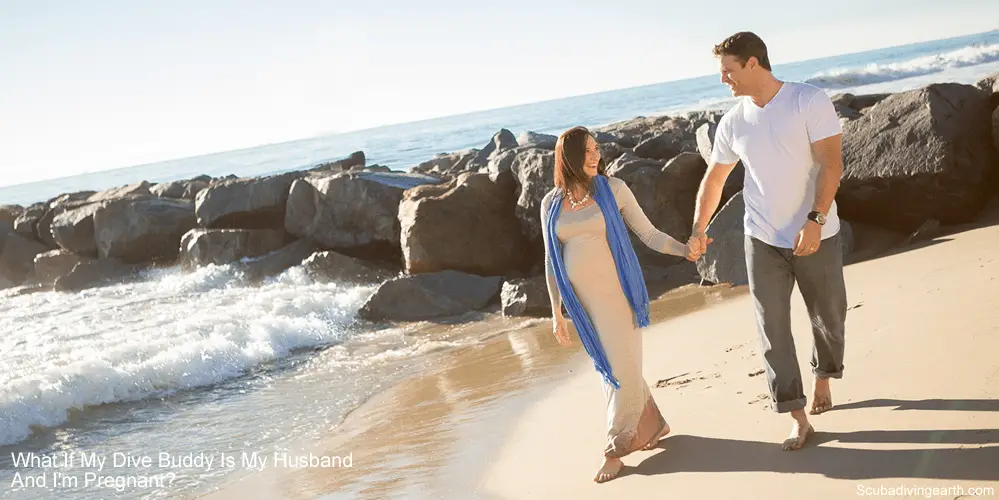
What if your dive buddy is your husband and you’re pregnant?
If your dive buddy is your husband and you’re pregnant you can let your husband continue to dive or he can support you and not scuba dive whilst you’re pregnant.
But you could choose snorkelling instead whilst you are pregnant. So you can enjoy snorkelling on the surface whilst your husband or partner scuba dives below.
When scuba diving from a dive boat, snorkeling from the same boat will depend on the dive site and the water depth. Second dives tend to be shallower so will provide a better opportunity to snorkel.
This scenario will depend on how you feel about this as a couple. It maybe those trips to the exotic places might be off the cards until you have your baby. But it’s something to look forward to once you give birth.
Once you’ve had the baby only one of you will be able to dive at a time. Unless you’re able to find a creche. So a good deal to agree would be that whilst you are pregnant he still dives when you’re can’t. But when you’ve had the baby you dive whilst he looks after the baby. Seems fair to me!
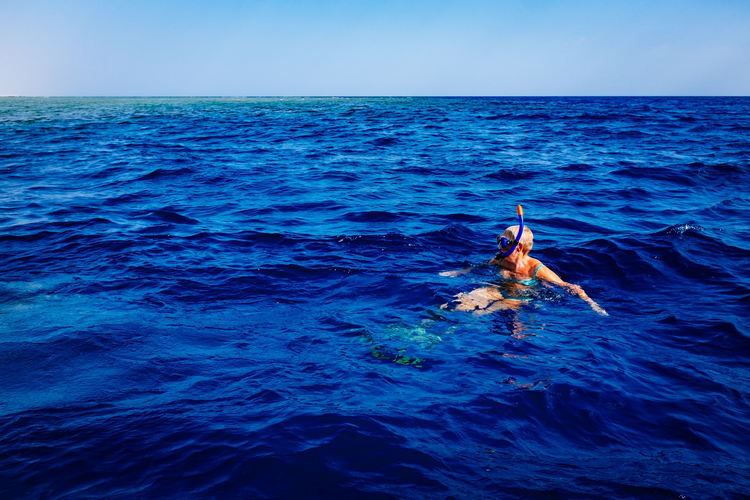
Can you snorkel when you are pregnant?
It would appear that snorkeling while pregnant is safe and a good way to get some exercise. But there are a number of limitations to snorkelling when pregnant, one of which is fitting into your exposure suit. Whilst wetsuits are stretchy, they are not designed to stretch around a pregnant tummy.
The risks of pulmonary barotrauma, an arterial gas embolism or decompression sickness don’t apply to snorkeling, as long as you don’t dive too deep on your surface dives.
As a water lover whilst you’ll be missing scuba diving whilst you’re pregnant, snorkeling can be a good substitute. If you are a scuba diving couple at least if your husband or partner can still go diving, you can still enjoy getting wet too.
But before you jet away or certainly before you jump in with your mask, snorkel and fins, always make sure you speak with your doctor first. Everything should be okay, but it’s always better to be safe than sorry.
What are the considerations when you’re snorkeling whilst pregnant?
- Duck diving or surface diving whilst pregnant.
- Extra vigilance snorkeling when pregnant.
1. Duck diving or surface diving whilst pregnant
Duck diving or doing a surface dive when you’re snorkeling requires you to hold your breathe. Having done some research it would appear from doctors this shouldn’t be a problem. Here’s a link to some answers about holding your breathe when pregnant, .
But the first doctor on this linked-to-page talks about intra-abdominal pressure not being good for placental blood flow.
So perhaps to be on the safe side to not cause harm to your unborn baby you should refrain from surface dives whilst you’re pregnant. Alternatively, speak with your doctor directly.
2. Extra vigilance snorkeling when pregnant
You should always be careful and stay safe when you’re snorkeling. But when you’re pregnant you’re caring for the two of you (or more if you’re carrying twins). Follow these extra safety precautions:
- Be extra vigilant when snorkeling nearby boats and other sea craft.
- Watch out for spiny sea urchins and nasty stinging jelly fish.
- Be extra careful not to step on stone fish or scorpion fish when you’re pregnant.
I’m not sure of any increased risk to you from being stung or by getting infected from the above when pregnant, but why risk it.
Tests on sheep in hyperbaric chamber – the science bit
Sheep have been used to study pregnancy as ewe placentas are similar to that of a human.
Foetal sheep whose mothers underwent decompression dives sometimes formed bubbles even when the mothers showed no signs of decompression sickness (DCS or the bends). The guidelines followed for decompression in these tests were done using U.S. Navy dive tables.
When further tests were carried out with the ewes that developed signs of the DCS, the foetus showed even more signs. The reaction noted from the foetal sheep was abnormal heart beats. Abnormal heart beat can be life threatening to unborn babies.
The problem for the foetus is the lungs are not fully developed and are bypassed. In the adult sheep or mother she is able to efficiently filter out any of the tiny nitrogen bubbles from the blood. However, this is not the same for the foetus.
The gas-exchange for the developing sheep is done through the placenta, which will not filter the bubbles in the same way. This therefore increases the risk of an arterial gas embolism.
Studies have also been done on dogs and rats too and has shown that nitrogen does cross through the placenta and into the tissues of the foetus. But each species has shown different results. Some of the results showed damage to the foetus, while others were perfectly fine. Which means the research is inconclusive at best, but does point to not diving while pregnant.
This can be life threatening for the developing foetus.
I hope you enjoyed this article about can you go diving while pregnant?
I’d love to hear from you. Tell us about your adventures of diving and snorkeling, in the comments below. Please also share your photos. Either from your underwater cameras or videos from your waterproof Gopro’s!
If this article hasn’t answered all of your questions. If you have more questions either about snorkeling or scuba diving (or specifically about can you go diving while pregnant), please comment below with your questions.
There will also be many more articles about scuba diving (and snorkeling) for you to read and learn about these fabulous sports.
Have fun and be safe!

